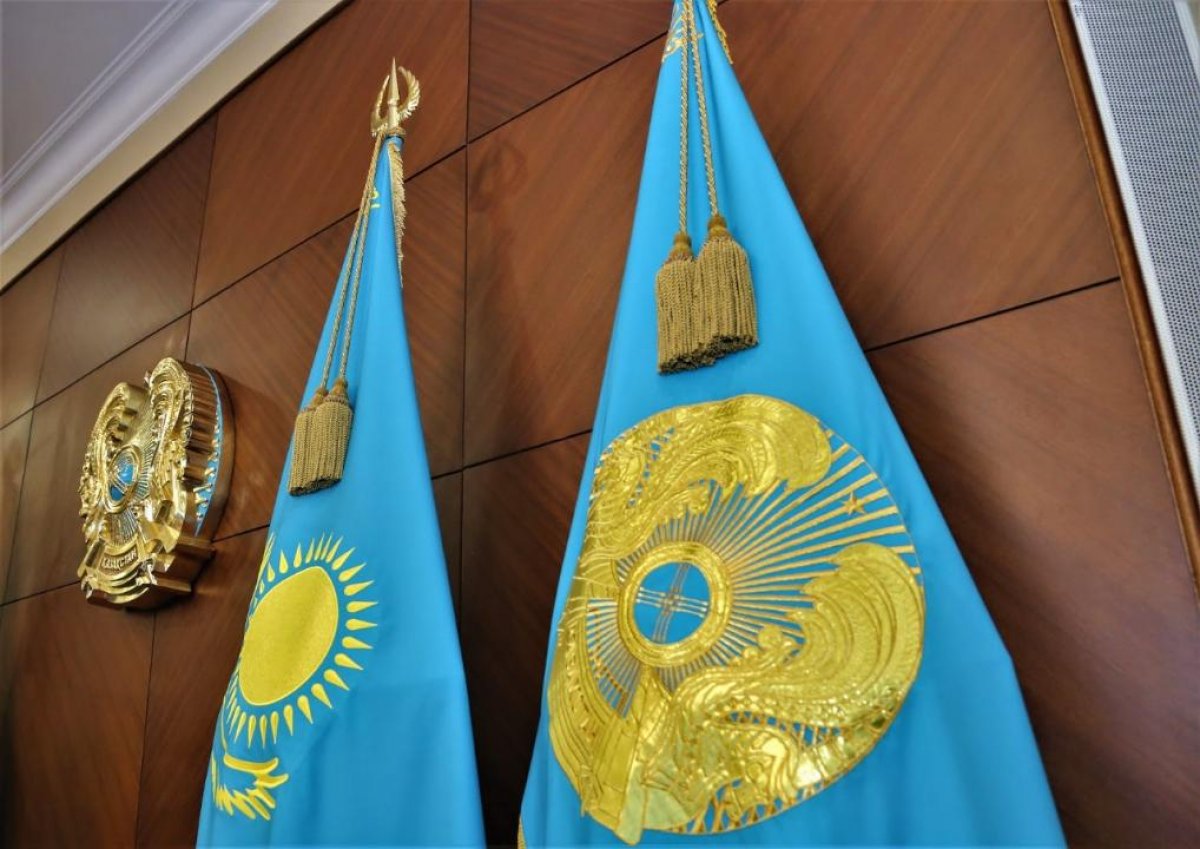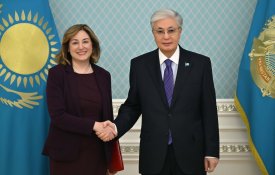Draft Law of the Republic of Kazakhstan "On amendments and additions to the Constitution of the Republic of Kazakhstan"
Decree of the President of the Republic of Kazakhstan on holding a republican referendum on June 5, 2022
In accordance with paragraph 1 of Article 91 of the Constitution of the Republic of Kazakhstan and Article 18 of the Constitutional Law of the Republic of Kazakhstan “On the Republican Referendum”, I DECREE:
1. Hold a republican referendum on June 5, 2022.
2. Submit to the republican referendum the draft Law of the Republic of Kazakhstan “On amendments and additions to the Constitution of the Republic of Kazakhstan” with the following wording of the question: “Do you accept the amendments and additions to the Constitution of the Republic of Kazakhstan set forth in the draft Law of the Republic of Kazakhstan “On amendments and additions to the Constitution of the Republic of Kazakhstan”, published in the media on May 6, 2022?”.
3. Officially publish, on May 6, 2022, this Decree and the draft Law of the Republic of Kazakhstan “On Amendments and Additions to the Constitution of the Republic of Kazakhstan”, in the media.
4. Entrust the organization and conduct of the republican referendum to the Central Election Commission, which performs the functions of the Central Referendum Commission, as well as to territorial and precinct election commissions, which perform the functions of territorial and precinct referendum commissions.
5. The Government of the Republic of Kazakhstan, together with the Central Election Commission of the Republic of Kazakhstan, other central state bodies and local executive bodies of the Republic of Kazakhstan, take the necessary measures to organize and conduct a republican referendum.
6. This Decree shall enter into force from the date of publication.
The president of the Republic of Kazakhstan
Kassym-Jomart Tokayev
Nur-Sultan, Akorda, May 5, 2022
No. 888
PROJECT
Law of the Republic of Kazakhstan "On Amendments and Additions to the Constitution of the Republic of Kazakhstan"
Article 1. Introduce the following amendments and additions to the Constitution of the Republic of Kazakhstan, adopted at the republican referendum on August 30, 1995:
1. In paragraph 1 of Article 4, the word "Council" shall be replaced by the word "Court".
2. Paragraph 3 of Article 6 shall be stated as follows:
“3. The land and its subsoil, water, flora and fauna, and other natural resources belong to the people. On behalf of the people, the right to property is exercised by the state. Land may also be in private ownership on the grounds, conditions and within the limits established by law.”.
3. Paragraph 2 of Article 15 shall be stated as follows:
"2. No one has the right to arbitrarily deprive a person of life. The death penalty is prohibited."
4. Paragraph 2 of Article 23 shall be stated as follows:
"2. Chairmen and judges of the Constitutional Court, the Supreme Court and other courts, chairmen and members of the Central Electoral Commission, the Supreme Audit Chamber of the Republic, military personnel, employees of national security agencies, law enforcement agencies should not be members of political parties, trade unions, support any political parties."
5. Paragraph 1 of Article 24 shall be stated as follows:
"one. Everyone has the right to freedom of labor, free choice of occupation and profession. Forced labor is allowed only on the basis of a judicial act on the conviction of a criminal or administrative offense or in a state of emergency or martial law.”
6. In Article 42:
1) clause 2 shall be stated in the following wording:
"2. The oath is taken on the second Wednesday of January in a solemn atmosphere in the presence of members of Parliament, judges of the Constitutional Court, the Supreme Court, as well as ex-Presidents of the Republic. In the case provided for by Article 48 of the Constitution, the person who has assumed the powers of the President of the Republic of Kazakhstan shall take the oath within one month from the date of assuming the powers of the President of the Republic.”;
2) part two of clause 5 shall be excluded.
7. Article 43 shall be supplemented with paragraphs 3 and 4 as follows:
“3. For the period of exercising his powers, the President of the Republic of Kazakhstan shall not be a member of a political party.
4. Close relatives of the President of the Republic of Kazakhstan are not entitled to hold positions of political civil servants, heads of subjects of the quasi-public sector.”.
8. In Article 44:
1) in subparagraph 2) the words "Senate of the Parliament" shall be replaced by the word "Parliament";
2) in subparagraph 3) the words "cancels or suspends, in whole or in part, the acts of akims of regions, cities of republican significance and the capital;" exclude;
3) subparagraph 4) shall be stated as follows:
“4) with the consent of the Senate of the Parliament, appoints the Chairman of the Constitutional Court, the Chairman of the National Bank, the Chairman of the Supreme Judicial Council, the Prosecutor General and the Chairman of the National Security Committee of the Republic of Kazakhstan; dismiss them from their positions;
4) in subparagraph 7) the words "Accounts Committee for Control over the Execution of the Republican Budget" shall be replaced by the words "Supreme Audit Chamber";
5) in subparagraph 10-1) the word "Council" shall be replaced by the word "Court";
6) in subparagraph 19) the word "secretary" shall be replaced by the word "advisor".
9. Paragraph 4 of Article 46 shall be deleted.
10. In Article 47:
1) in paragraph 1 the word "Council" shall be replaced by the word "Court";
2) in paragraph 2 the word "Council" shall be replaced by the word "Court".
11. In article 50:
1) the second sentence of paragraph 2 shall be stated as follows:
"Ten deputies of the Senate are appointed by the President of the Republic, five of which - at the proposal of the Assembly of the People of Kazakhstan.";
2) clause 3 shall be stated in the following wording:
“3. The Majilis consists of ninety-eight deputies elected in the manner prescribed by the constitutional law under a mixed electoral system: according to the system of proportional representation in the territory of a single nationwide constituency, as well as in single-seat territorial constituencies.
12. Paragraph 1 of Article 51 shall be stated as follows:
"one. The election of deputies of the Mazhilis is carried out on the basis of universal, equal and direct suffrage by secret ballot. The next elections of deputies of the Mazhilis are held no later than two months before the expiration of the term of office of the current convocation of the Parliament.
13. Part three of paragraph 5 of Article 52 shall be stated as follows:
“A deputy of the Mazhilis of the Parliament is deprived of his mandate when:
1) withdrawal or expulsion of a deputy from the political party from which, in accordance with the constitutional law, he was elected on the basis of a party list;
2) termination of the activities of a political party from which, in accordance with the constitutional law, a deputy was elected on the basis of a party list;
3) recall by voters, in the manner determined by the constitutional law, of a deputy elected in a single-mandate territorial constituency.
14. In article 53:
1) supplement with subparagraphs 1-1) and 1-2) of the following content:
“1-1) adopts constitutional laws;
1-2) conducts a repeated discussion and voting on constitutional laws or articles of a constitutional law that raised objections from the President of the Republic, within a month from the day the objections were sent. Failure to comply with this deadline means acceptance of the objections of the President. If the Parliament, by a three-quarters majority of the total number of deputies of each of the Chambers, overcomes the objections of the President, the President signs the constitutional law within one month. If the objections of the President are not overcome, the constitutional law is considered not adopted or adopted in the wording proposed by the President;”;
2) in subparagraph 2) the words "Accounts Committee for Control over the Execution of the Republican Budget" shall be replaced by the words "Supreme Audit Chamber";
3) in subparagraph 6) the word "Council" shall be replaced by the word "Court".
15. In article 54:
1) the first paragraph of paragraph 1 shall be stated as follows:
"one. The Parliament adopts laws in a separate session of the Chambers by sequential consideration of issues first in the Majilis and then in the Senate, including:”;
2) subparagraph 2) of paragraph 2 shall be stated as follows:
“2) conducts a repeated discussion and voting on laws or articles of the law that raised objections from the President of the Republic, within a month from the day the objections were sent. Failure to comply with this deadline means acceptance of the objections of the President. If the Majilis and the Senate, by a two-thirds majority of the total number of deputies of each of the Chambers, overcome the objections of the President, the President signs the law within one month. If the objections of the President are not overcome by at least one of the Chambers, the law is considered not adopted or adopted in the wording proposed by the President;
16. In Article 55:
1) subparagraph 2) shall be stated as follows:
“2) giving consent to the appointment by the President of the Republic of the Chairman of the Constitutional Court, the Chairman of the National Bank, the Chairman of the Supreme Judicial Council, the Prosecutor General, the Chairman of the National Security Committee of the Republic;”;
2) subparagraph 3) shall be supplemented with the words ", Commissioner for Human Rights in the Republic of Kazakhstan".
17. In paragraph 1 of article 56:
1) in subparagraph 1) the words “and consideration of these projects” shall be excluded;
2) supplement with subparagraph 3-1) of the following content:
"3-1) hearing twice a year the report of the Chairman of the Supreme Audit Chamber;".
18. Subparagraph 1) of Article 57 shall be stated as follows:
“1) appoints three judges of the Constitutional Court; appoints two members of the Central Electoral Commission and three members of the Supreme Audit Chamber for a five-year term;
19. Subparagraph 7) of paragraph 3 of Article 58 shall be amended as follows:
"7) submit to the Chambers candidates for appointment to the positions of judges of the Constitutional Court, members of the Central Election Commission, the Supreme Audit Chamber;".
20. In Article 61:
1) clause 2 shall be supplemented with the second part of the following content:
“Draft laws introduced as a legislative initiative of the Government of the Republic in order to promptly respond to conditions that threaten the life and health of the population, the constitutional order, the protection of public order, and the economic security of the country, are subject to consideration by the Parliament immediately at a joint meeting of its Chambers.”;
2) clause 3 shall be supplemented with part three as follows:
“In case of submission to the Parliament of the draft laws provided for by part two of paragraph 2 of this article, the Government of the Republic has the right to adopt, under its own responsibility, temporary regulatory legal acts having the force of law on the issues specified in part one of this paragraph, which are valid until the entry into force of those adopted by Parliament laws or until Parliament fails to pass laws.”;
3) paragraphs 4 and 5 shall be stated as follows:
"4. A law adopted by a majority vote of the total number of deputies of the Mazhilis is submitted to the Senate, where it is considered for no more than sixty days.
The Majilis has the right to generally reject the draft law by a majority vote of the total number of deputies. The rejected bill is considered not adopted and is returned to the initiator.
A law approved by a majority vote of the total number of deputies of the Senate is submitted to the President for signature within ten days. If the Senate does not approve the law as a whole or its individual articles, then the law is returned to the Mazhilis. At the same time, the Senate has the right to propose to the Mazhilis a new version of certain articles of the law.
In the event that the Senate has not adopted a relevant decision within sixty days, the law is submitted to the President for signature.
5. If the Mazhilis, by a majority vote of the total number of deputies, agrees with the wording of certain articles of the law proposed by the Senate, the law is considered adopted by the Mazhilis in a new edition and approved by the Senate and is submitted to the President for signature within ten days.
If the Majilis, by the same majority of votes, objects to the wording of certain articles of the law proposed by the Senate, and also if the Senate has not approved the law as a whole, disagreements between the Chambers are resolved through conciliation procedures.
The version of the law worked out by the conciliation commission is subject to consideration by the Majilis and the Senate in the manner prescribed by paragraph 4 of this article.
In cases where the Mazhilis has not adopted the law in the wording proposed by the conciliation commission by a majority vote of the total number of deputies of the Chamber, the Majilis shall conduct a second vote on the law in the previously adopted wording.
If, during the repeated voting, the Mazhilis confirms the earlier decision by a two-thirds majority of the total number of deputies of the Chamber, the law is submitted to the President for signature within ten days.
If the law does not gain the indicated majority of votes of the deputies of the Majilis, the law is considered not adopted and is returned to the initiator.”;
4) clause 5-1 shall be deleted.
21. In Article 62:
1) clause 5 shall be stated in the following wording:
"5. Laws are adopted by the Mazhilis, approved by the Senate by a majority vote of the total number of deputies of the Chambers, unless otherwise provided by the Constitution.
Decisions of the Parliament and its Chambers are adopted by a majority vote of the total number of deputies of the Chambers, unless otherwise provided by the Constitution.”;
2) clause 6 after the word "Kazakhstan" shall be supplemented with the words ", according to draft constitutional laws".
22. In the heading of section VI, the word "Council" shall be replaced by the word "Court".
23. Article 71 shall be stated as follows:
"Article 71
1. The Constitutional Court of the Republic of Kazakhstan consists of eleven judges, including the Chairman, whose powers last for six years.
The same person cannot be appointed as a judge of the Constitutional Court more than twice in a row.
2. The Chairman of the Constitutional Court is appointed by the President of the Republic with the consent of the Senate of the Parliament.
3. Four judges of the Constitutional Court are appointed by the President of the Republic, three judges of the Constitutional Court are appointed respectively by the Senate and the Majilis.
The Deputy Chairman of the Constitutional Court is appointed by the President of the Republic on the proposal of the Chairman of the Constitutional Court from among the judges of the Constitutional Court.
4. The position of a judge of the Constitutional Court is incompatible with a deputy mandate, holding other paid positions, except for teaching, scientific or other creative activities, carrying out entrepreneurial activities, being a member of the governing body or supervisory board of a commercial organization.
5. Judges of the Constitutional Court, during their term of office, may not be arrested, brought to justice, subjected to administrative penalties imposed in court, brought to criminal responsibility without the consent of the Parliament, except in cases of detention at the scene of a crime or serious crimes.
6. The organization and activities of the Constitutional Court are regulated by constitutional law.”.
24. In Article 72:
1) in paragraphs 1 and 2 the word "Council" shall be replaced by the word "Court";
2) add paragraphs 3, 4 and 5 with the following content:
“3. The Constitutional Court, at the request of citizens, considers for compliance with the Constitution of the Republic the normative legal acts of the Republic of Kazakhstan that directly affect their rights and freedoms, enshrined in the Constitution.
The procedure and conditions for the appeal of citizens to the Constitutional Court are determined by the constitutional law.
4. The Constitutional Court, at the request of the Prosecutor General of the Republic, considers the issues specified in subparagraphs 3) and 4) of paragraph 1 of this article, as well as the regulatory legal acts of the Republic of Kazakhstan for their compliance with the Constitution of the Republic.
5. At the request of the Commissioner for Human Rights, the Constitutional Court considers for compliance with the Constitution of the Republic regulatory legal acts affecting the rights and freedoms of a person and citizen enshrined in the Constitution.”.
25. In Article 73:
1) in paragraphs 1 and 2 the word "Council" shall be replaced by the word "Court";
2) clause 3 shall be stated in the following wording:
“3. The Constitutional Court renders its decision within the terms established by the constitutional law.”.
26. In Article 74:
1) clause 2 shall be stated in the following wording:
"2. Laws and other legal acts, their separate provisions, recognized as unconstitutional, including those infringing on the rights and freedoms of a person and citizen enshrined in the Constitution, are canceled and are not subject to application from the date of the decision of the Constitutional Court or from the date established by it.”;
2) in paragraph 3 the word "Council" shall be replaced by the word "Court".
27. The title of Section VII shall be stated as follows:
"Section VII
Courts and Justice. Prosecutor's office. Commissioner for Human Rights".
28. In Article 78 the word "Council" shall be replaced by the word "Court".
29. Paragraphs 4 and 5 of Article 82 shall be stated as follows:
"4. The Chairman of the Supreme Judicial Council is appointed by the President of the Republic with the consent of the Senate of the Parliament.
5. The status, procedure for the formation of the composition and organization of the work of the Supreme Judicial Council are determined by law.”.
30. In article 83, paragraph 4, the word "law" shall be replaced by the words "constitutional law".
31. Supplement Article 83-1 with the following content:
"Article 83-1
1. The Commissioner for Human Rights in the Republic of Kazakhstan contributes to the restoration of violated rights and freedoms of a person and a citizen, promotes the rights and freedoms of a person and a citizen.
2. When exercising his powers, the Commissioner for Human Rights is independent and not accountable to state bodies and officials.
3. During the term of his powers, the Commissioner for Human Rights may not be arrested, brought to justice, subjected to administrative penalties imposed in court, brought to criminal responsibility without the consent of the Senate, except for cases of detention at the scene of a crime or serious crimes.
4. The legal status and organization of the activities of the Commissioner for Human Rights are determined by the constitutional law.”.
32. In article 87:
1) clause 4 shall be stated as follows:
"4. Akims of regions, cities of republican significance and the capital are appointed by the President of the Republic with the consent of deputies of maslikhats located on the territory of the region, or deputies of maslikhats of cities of republican significance and the capital, respectively.
The President of the Republic proposes at least two candidates, which are voted on. The candidate who receives more votes from the maslikhat deputies who took part in the voting is considered to have received consent.
Akims of other administrative-territorial units are appointed or elected to office, as well as dismissed from office in the manner prescribed by law. The President of the Republic has the right, at his own discretion, to dismiss akims of regions, cities of republican significance and the capital.”;
2) the second sentence of paragraph 5 shall be stated as follows:
“In this case, the maslikhat, by a majority vote of the total number of its deputies, has the right to express no confidence in the akim and raise the issue of his dismissal from office, respectively, before the President of the Republic in relation to the akims of regions, cities of republican significance and the capital, or by a higher akim in relation to akims of other administrative-territorial units. ".
33. In paragraph 4 of Article 88, the word "President," shall be deleted.
34. In Article 91:
1) clause 2 shall be stated in the following wording:
"2. The independence of the state, the unitarity and territorial integrity of the Republic, the form of its government, the fundamental principles of the activities of the Republic, established by the Constitution, are unchanged.”;
2) in paragraph 3 the word "Council" shall be replaced by the word "Court".
35. Supplement Article 99 with the following content:
"Article 99
1. Until the formation of the Constitutional Court and the Supreme Audit Chamber, the chairmen and members of the Constitutional Council and the Accounts Committee for Control over the Execution of the Republican Budget shall retain their powers.
Until the formation of the Constitutional Court, the functions of the Constitutional Court, provided for in paragraphs 1 and 2 of Article 72 of the Constitution, shall be carried out by the Constitutional Council.
2. Normative resolutions of the Constitutional Council shall be applied to the extent that they do not contradict the Constitution until they are reviewed by the Constitutional Court.
3. The provisions of the Constitution of the Republic of Kazakhstan on the formation of the Chambers of the Parliament shall apply starting from the elections of deputies of the Majilis of the Parliament of the eighth convocation.”.
Article 2
1. The provisions of the Constitution of the Republic of Kazakhstan, which determine the procedure for the adoption of constitutional laws and laws, as well as the activities of the Constitutional Court, shall enter into force on January 1, 2023.
Draft laws approved by the Majilis and being considered by the Parliament as of January 1, 2023 are considered laws and are considered in the manner prescribed by Article 61 of the Constitution of the Republic of Kazakhstan.
2. The norms of the Constitution of the Republic of Kazakhstan, establishing a new procedure for empowering officials, shall be put into effect as the term of office expires or the powers of these officials terminate, unless otherwise provided by the Constitution of the Republic of Kazakhstan.
3. Until the composition of the Supreme Audit Chamber is formed, the Accounts Committee for Control over the Execution of the Republican Budget continues to exercise the functions and powers provided for by the legislation of the Republic of Kazakhstan.
Article 3. This Law shall enter into force from the day of the official publication of the report on the results of the referendum, subject to the provisions of Article 2 of this Law.
kazpravda.kz











